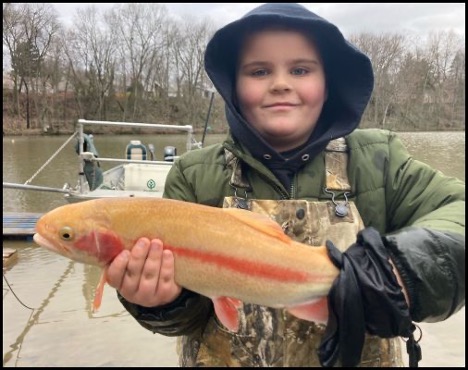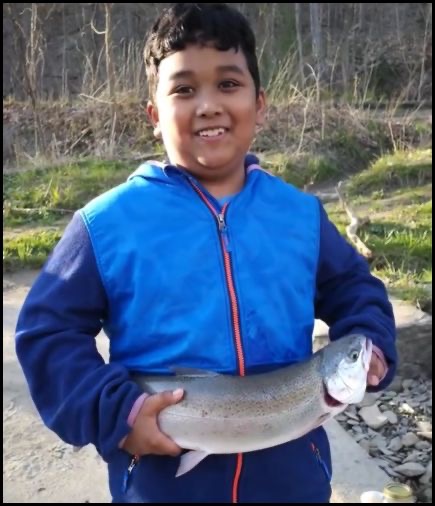April 11, 2024
Posted: April 11 , 2024

***NOTE: The Fishing Report Blog is updated weekly on Thursdays from September-May*** Rivers are elevated and muddy and more rain is coming. Anglers can monitor the most recent river conditions at the following links: <Rocky River flow gage data> <Chagrin River flow gage data> <Rocky River NEORSD station with turbidity>. Cleveland Metroparks stocked a final round of 900 pounds of rainbow trout at Wallace Lake instead of the river this week due to conditions (details below).
The Rocky and Chagrin rivers are elevated and muddy and with more rain on the way this scenario will likely continue through the weekend. Wise anglers will keep tabs on the flow data at the links above when planning a trip to the river. As the streams first begin to clear nickel size spawn sacks in brighter colors such as chartreuse, hot pink, and hot orange will work well. This past week it was clear that the steelhead run is over the hump with fewer fresh fish and lots of post spawn, aka “dropback”, steelhead remaining. There are a decent number of fresh skipper steelhead (smaller 13-20” fish, aka jacks) in the lower river by the boat ramps. I expect that by the time water levels have dropped again the number of steelhead remaining will have further declined. Still, there should be targetable numbers of steelhead around through the next few weeks.
On the plus side, lake-run smallmouth bass numbers are strong. “Smallies” migrate up the Rocky, Chagrin and Cuyahoga rivers on their spawning runs in spring. Smallmouth bass will strike artificial lures similar to steelhead - such as medium size crankbaits, spinners, tube jigs (dark brown and olive are good) as well as marabou jigs under floats and streamer flies that imitate gobies, minnows and crayfish. Late spring offers a great opportunity to score the "silver and bronze", which is catching a steelhead and lake-run smallmouth bass in the same day, often from the same pool on the same offering! Lake-run bass are typically available in the streams until early June. For anglers interested in targeting suckers, which some folks utilize into fish patty recipes, a worm on a single hook fished on the river bottom works well, as can smaller nymph patterns on the fly rod.
Yesterday we pivoted and stocked the final scheduled 900 lbs of rainbow trout into Wallace Lake due to flooded conditions on the East Branch rocky River. Previously this spring we had stocked 2,250 lbs of trout in the East Branch rocky river and 450 lbs in Wallace Lake. In the river the fish were stocked at five locations between Rt 82 (Royalton Road) and Wallace Lake. Additionally, trout stocked throughout the winter remain at Wallace, Ledge and Shadow lakes (see a photos of some fine trout from Wallace below). The Ohio Division of Wildlife stocked rainbow trout (500 fish) at Shadow Lake on Friday March 22nd, as well.
The Cleveland shoreline of Lake Erie will be heating up soon for post-spawn walleye anglers casting shallow running stickbaits from shore after dark withy Edgewater park and E55th wall being good spots. Harbor areas at Edgewater, Wildwood and E72nd boat ramp offer mixed catch opportunities in late spring for largemouth bass, rock bass northern pike, yellow perch and sunfish species. As the water continues to warm the breakwall area at E55th traditionally offers opportunities to catch yellow perch or white perch using minnows or bits of worms on crappie spreaders on the bottom.
A Story of Perseverance at Wallace Lake. Brian Kich has been trying to catch a tiger trout at Wallace Lake for the past 3 months. He had caught 4 tigers total between the previous 2 years and wanted to keep the streak alive. Following countless casts he has caught plenty of other fish in the process, several of which have been in the fishing report in recent weeks. Then, while casting a spinner this past Saturday, he was shocked to instead catch a 25” walleye (the first I’ve ever heard from in the lake- most likely an angler release). He figured he might not get his tiger trout after all but this was quite a consolation prize, which he released. Then, the very next day- it happened. He got a tiger trout while again casting a spinner! My hat is off to Brian for reaching his goal! See photos of his catches from his memorable weekend below.
Photo Release Waivers for Fishing Blog Photos (fast and easy to complete online). Photo release waivers for photos sent in for the fishing report can easily be completed online through Smart Waiver (takes only about 30 seconds to complete) at the following link: <Smart Waiver link>. You only need to do this one time and any future additional photos submitted are already covered.
If you have a photo that you would like to contribute to the fishing report, or if you have any further questions regarding fishing in the Cleveland Metroparks, you may contact Aquatic Biologist Mike Durkalec at (440) 331-8017 or md@clevelandmetroparks.com .
Tight Lines,
Mike

A proud young angler shows off his first steelhead ever caught in the Rocky River (photo courtesy of Chiem Leng).

Last Wednesday we sampled fish at Wallace Lake (fishing and electrofishing) with students from James Ford Rhodes High School got some neat specimens.
Do you keep steelhead to eat? If so, researchers need your assistance with harvested jacks/skippers (smaller legal size steelhead) to collect data that will help the state refine the hatchery production process. Specifically they need (this is from Dr. Jeff Minor at BGSU who has done some very enlightening research on Lake Erie fish in the past. He can be reached at jminer@bgsu.edu): If a fisherman catches a Steelhead Trout 13-20 inches in length from the six Ohio tributaries to Lake Erie stocked with trout (Vermilion, Rocky, Chagrin, Ashtabula, Grand, and Conneaut rivers) or in Ohio waters of Lake Erie, we would very much appreciate obtaining data about these trout. Specifically, we need to know the location the fish was caught, the length of the fish, and its head (to get the ear bones). Thus, we are not asking fisherman to give us the part of the fish they can consume (enjoy the fillets!). If they place the head or whole body and data in a baggie in the freezer and then contact me (jminer@bgsu.edu), I will contact them and make plans to come pick up the fish. We need a good number of these fish to scientifically test our hypothesis, so I wish fisherman tight lines on the river (or in Lake Erie).
Regarding the full research plan for those who want to read more: Our goal is to help the ODOW optimize its hatchery production so that fisherman can get the best experiences when they fish for adult Steelhead Trout in the Lake and returning to our rivers. The Ohio DOW does a great job obtaining the best strains of Steelhead Trout, but they do not know which strains have the best chances of returning as adults. Additionally, all trout raised in hatcheries (everywhere) appear to go through periods of stress in hatcheries that affect their ability to hear and balance. This impediment occurs through the hearing system in fish, that is, their otoliths (ear bones) are affected. All trout start life with ear bones made of high-density material (aragonite) that makes for great hearing acuity; however in hatcheries, when stressed, these ear bones will grow as a low density form (vaterite) and this reduces the ability of the fish to hear. At the ODOW state hatchery in Castalia where Steelhead Trout are raised, about 50% of the fish have these poor-hearing ear bones, and some strains have even a greater percentage with the low density otoliths. Our current research focus is on determining 1) the stresses causing the shift to the poor-hearing ear bones, 2) the effect this shift has on vulnerability to predators (lab study), and 3) whether or not the low density ear bones affect return rates of these fish to the spring Steelhead Trout fishery (field study).
BGSU has data on the ear bone status of the Steelhead Trout smolts stocked in Ohio tributaries in spring 2023. Our field study involves comparing the ear bones of those smolts with the ear bones of jacks returning to our rivers this spring. Thus, we are asking you to help us get the word to fisherman that we could really use their help collecting data from these jacks (13-20 inches).
Note: The fishing report is updated monthly in June, July, and August and weekly every other month
***Note: All photo submissions must first complete the Cleveland Metroparks photo waiver.***
2024 Cleveland Metroparks Registered Fishing Guides(name, company, contact)
- #24-001 Gareth Thomas, Alley Grabs Guide Service, alleygrabs@gmail.com (216) 235-5056
- #24-002 Jeff Liskay, Great Lakes Flyfishing LLC, jeffliskay@gmail.com (440) 781-7536
- #24-003 Monte Casey, The Steelhead Guide, (440) 773-8064 www.steelheadguide.com
- #24-004 Anthony Montagnese, Covered Bridge Outfitters, anthonymont@live.com (440) 320-105
- #24-005 Lucas Smith, What That Vise Do LLC, whatthatvisedo@gmail.com (724) 841-1564
- #24-006 Nicholas DelVecchio, Wildwood Outfitters, wildwood16317@gmail.com (724) 433-2315
- #24-007 Nate Miller, Steelhead Alley Outfitters, www.steelheadalleyoutfitters.com (440) 796-6105
- #24-008 Jim Lampros, jlampros2@gmail.com (216) 513-6011
Learn how you can support recreation opportunities through a donation to the Cleveland Metroparks Fishing Fund.
